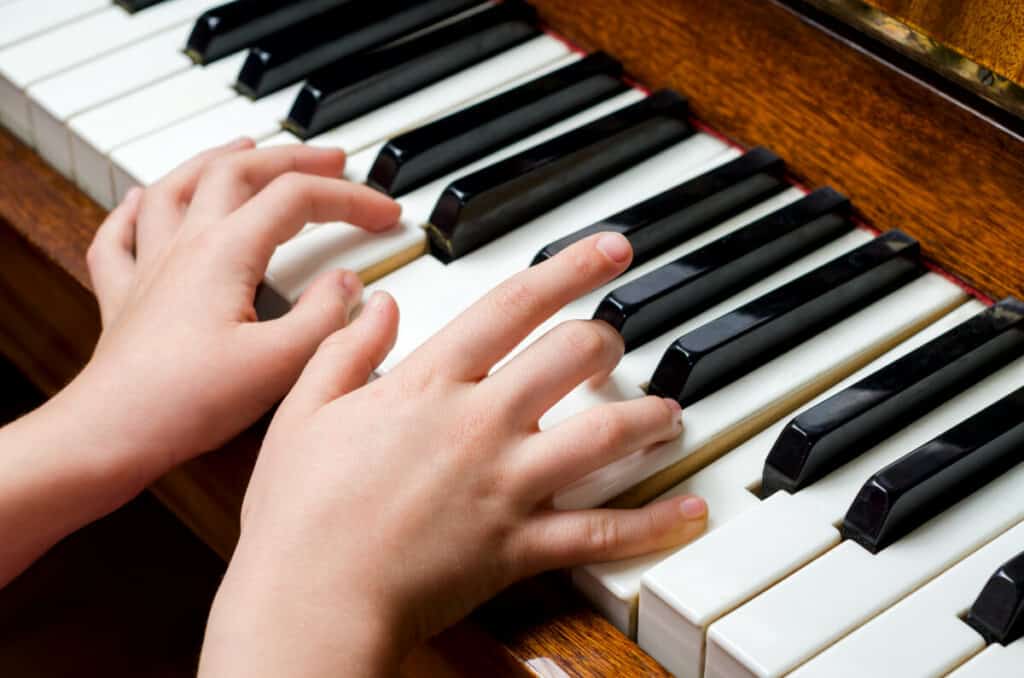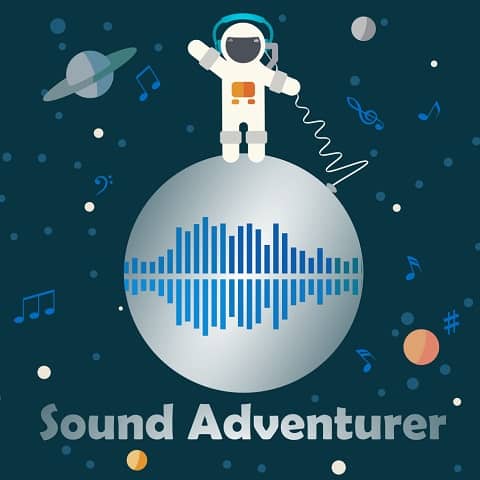This post contains affiliate links. We earn commissions if you purchase products from retailers after clicking on a link from our site. As an Amazon Associate, we earn from qualifying purchases.
Learning the piano is no joke. It’s a challenging and deep instrument that you can spend a lifetime mastering. So when you ask, how long it take to learn, it really depends on what you mean! We’ll dive into that and give you an idea of what to expect.
- You can learn basic piano skills in 3 months of regular practice, including basic music theory, simple songs, and basic technique.
- In a year’s time of regular practice you can play intermediate songs and have an understanding of the most common scales and chords, as well as improvements in technique, and music theory knowledge
- In 3 year’s time of regular practice you should be able to play advanced songs and be able to understand the ins and outs of practical music theory.
- In 10 year’s time of regular practice you should be an expert, and depending on your specialty, be able to comp without hesitation and improvise.
That’s all easy to say, but there’s a lot that needs to be talked about:
What does regular practice mean? When someone says they’ve been playing the piano for 3 years, what does that mean? Let’s dive into that–by the end you’ll be able to have a clear picture of what to expect from yourself.

By the way, looking for recording equipment and musical instruments? Check out Sweetwater.com for microphones, monitors, audio interface or any other recording gear that you could ever need. (Affiliate Link)
What Do I Mean By Regular Practice?
First, before we can understand the rest of this article, I need to define what regular practice means–in my opinion, regular practice means 5-7 hours of quality practice a week.
The timeframe changes when you put in more hours. So, if you want to become a pro within a few years, you need to up that to around 20 hours of practice
What Can You Do With 3 Months of Regular Piano Practice? (around 60-84 hours of practice)
If you’re starting from ground zero in your music adventure, then this is what you can expect:
- Being able to read the treble and bass clefs, and be comfortable playing 3-4 notes above the ledger lines
- Your left hand and right independence will not be very solid. You will be able to play very simple patterns with your left hand while you play melodies with your right hand.
- You’ll learn a couple scales, including the C Major Scale and you may learn a little about major and minor scales
- You’ll be able to play simple songs, but you won’t be able to play full arrangements of the songs you like to listen to unless you memorize the song, which will be very time-consuming for you at this point.
- You won’t be able to handle quick note transitions very evenly.
Now, you may be a bit different, you may learn faster or slower depending on if you already have experience with other musical instruments, but I wouldn’t expect much more from yourself if you are a complete music beginner
What Can You Do With 6 Months of Regular Piano Practice? (around 120-168 hours of practice)
This is where the piano starts to get fun. If you’ve been diligent in your practice, you’ll be able to actually play songs you like, albeit simple versions of them
- You’ll know or be on your of knowing all the major scales
- You may have an established warmup routine
- You will be developing a sense of rhythm and your notes will sound more even and in time.
- You can play simplified versions of songs that you like.
- You will be able to do basic sight reading and be able to play a simple song without having to memorize it
- You’ll be able to understand and play the notes of the clefs including the ledger lines
- Your left-hand and right-hand independence is growing, and you’ll be able to play different patterns with your left and right hands at the same time.
- You should be able to handle 16th-note rhythms at the most common tempos in small groups.
Depending on your style of learning, this is the make it or break it phase–if you can put more hours into piano than this you will be breaking through a difficult barrier. Up to now, learning piano will be more of a grind and less fun–but once you can play music you love, then it becomes much more gratifying.
What Can You Do With A Year of Regular Piano Practice? (around 260-364 hours of practice)
You’ve done it–you’ve broken through the glass ceiling and you’ve stuck with it. You’ll be able to do the following, now:
- Play Intermediate difficulty songs. This includes full arrangements of popular music that you like to listen to. Learning the song is still tough and takes many days of practice and memorization, but you are capable and able to play it well
- You should be able to play complicated rhythms and patterns with both hands with practice
- You will have an established warmup routine
- You should be able to handle difficult technique and tempos
- You should know all the major and minor scales and understand the circle of fifths through and through.
- You should know different styles of playing and be able to play jazz and classical pieces
- You should know how to play chords and have some comping competency.
- At this point you will have established the style of music that you’re interested in–it could be if you are trying to be a professional that you are learning multiple styles, but if you are playing for your own personal benefit that you are specialized.
Where you are at this point depends on your goals and your teacher. If you have no ounce of interest in jazz piano, you may not be so strong on your chords, likewise, you may not be able to easily sight read or play difficult classical pieces if you are more into jazz piano.
What Can You Do With 3 Years of Regular Piano Practice? (around 780-1092 hours of practice)
You can participate in many bands now–you have the chops to play multiple styles of music and you can improvise and adapt to a performance as needed.
- You can play most songs with enough practice. Intermediate and advanced level songs don’t take nearly as much practice to nail down
- You can sight-read intermediate pieces without difficulty
- You know all you want to know about musical theory
Past this point, all the way up to 10 years of practice, you can be a professional, teach, or have an incredibly satisfying skill that you can take with you for the rest of your life.
This journey can be accelerated by improving the quality of your practice and the amount of time practicing. It’s not enough to spend time playing the same songs over and over again–quality practice will always be hard and push you.
How To Learn The Piano Faster?
I did an experiment a couple of years ago, I practiced piano for an hour a day for a month and took note of what that did for my own skill level. It made a tremendous difference for me and my skills improved dramatically. You can check out the video here:
I learned a lot from the experience, and I’ll tell you what you can do to accelerate your piano learning:
- Make your practice hard. If it’s not hard or challenging, you probably aren’t learning effectively
- Get a mentor: this could look like buying an online course (I recommend this one), or getting a piano teacher
- Make it a daily time goal. If you are committed to practice for a certain amount of time, that’s a good starting point. If you organize your time to do specific objectives like: “warmup, practice scales, practice chords, practice a song, practice sight reading”, that will help you focus on specific areas and make your practice time go quickly.
I really recommend Piano4all for those who are learning the piano… I think it’s a fresh way at learning that was way more fun and productive than other lessons I’ve had:
